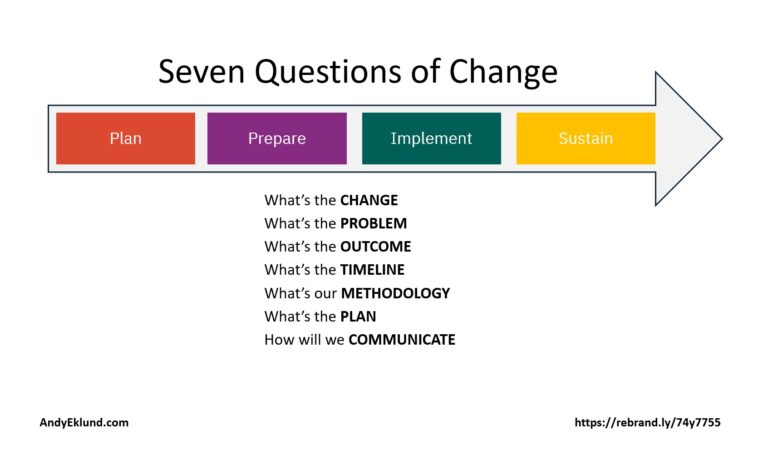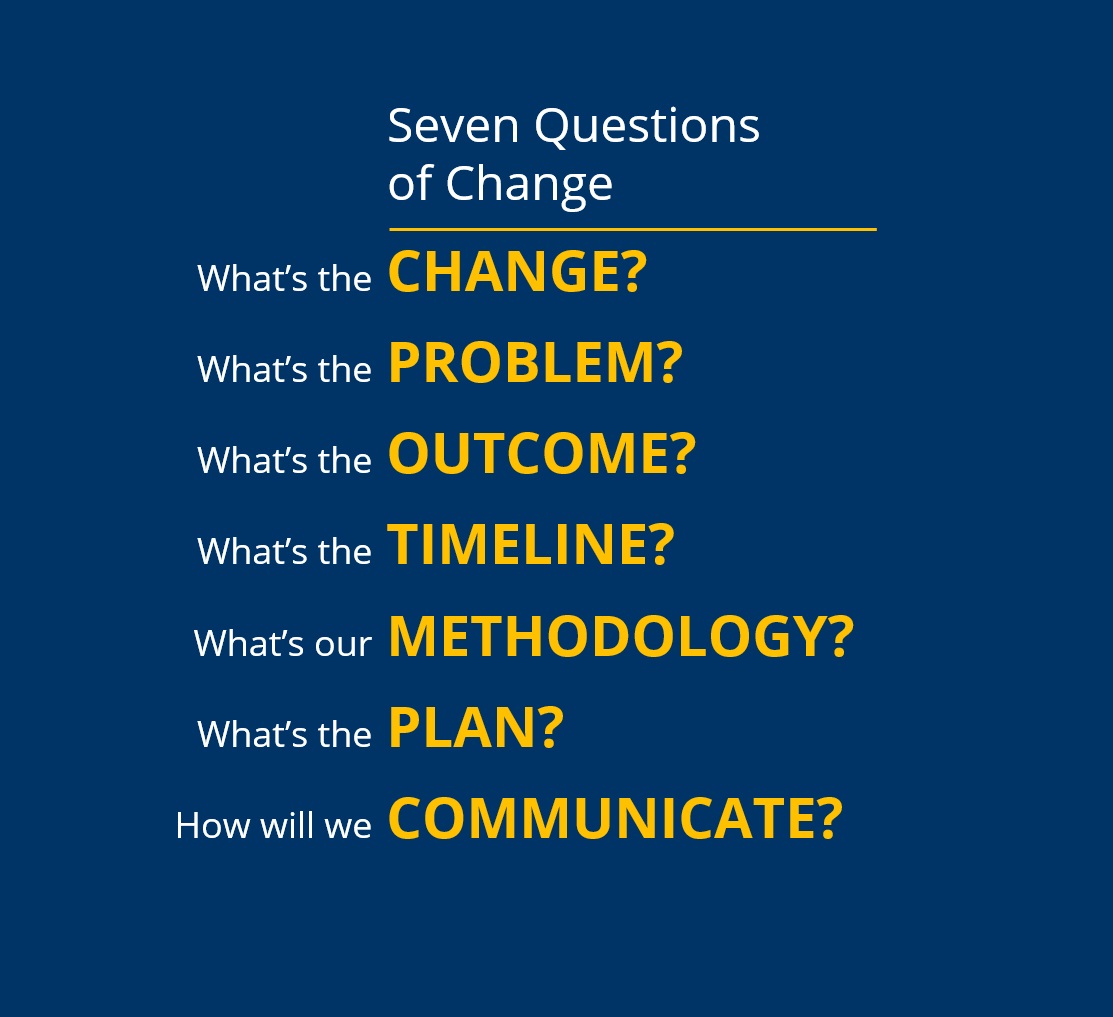While there are many questions to consider at the beginning of a change management program, here are the basic seven that have always helped me get my head sorted, before the team starts to plan or begins stakeholder engagement.
Don’t get me wrong. A good model is important for a successful change program. But as important as the model are the questions that need to be asked, if not to debate the answers so there Is a clear picture from the start of what needs to happen, by who and by when.
Even if you’ve chosen your preferred change model, the questions are still relevant to ask in your first planning meeting. I remember several times when I was brought into the situation without introduction or information. I used these questions as my direction to get me centred on what the program may need to do. I’ve also found they make an ideal agenda for a planning meeting if that’s relevant to your team as well.
To be fair, the seven questions are more categories of questions than individual questions. That means you are free to tailor, add, flex and edit to suit your situation. Feel free to add your own questions below if you have any examples.
Start with these Seven Questions of Change
1. What’s the change?
This may be blazingly obvious, but it’s not uncommon for a change program to start without preciseness.
What are you precisely, exactly asking people to do and by when?
Doran’s SMART principles work well here.
- What’s the change specifically?
- Can you measure that specific change, and how?
- Is true change really achievable?
- Is the change relevant, and why? Which relevant spokespeople say so?
- What’s the time frame? How long do you have optimistically and realistically?
2. What’s the problem?
Beyond where most employees can see from their day-to-day persepctive …
- What problem has appeared?
- What’s happened in the world that’s demanding they take this change seriously?
- Whatever the problem is, why does it mean they have to change? Or, change now?
- Is there any other way to solve this problem?
3. What’s the outcome?
At the end of the campaign …
- What explicit outcome does the key decision maker want to see, have in place, or is followed by everyone by the end of the program?
- What do you need to provide staff – training as an example – so they can physically and psychologically change?
- Can you measure the change effectively and credibly?
- What’s the budget for the overall program?
As it relates to outcome, other questions will also start to emerge.
- Is it realistic to think every single employee will change?
- How long will the campaign realistically take to complete?
- Who will change first? Who are you innovators or early adopters?
- Is there an order? Does one department have to change ahead of another?
- Who are your pragmatists (the ones who want simplicity)? Who are your conservatives (the ones who don’t want to be embarrassed or threatened)?
- Who will be most fearful?
- Most of all, how will you handle the ones who refuse to change?
Finally (perhaps because I’ve been around the block a few times) you might ask yourself: are you asking too much?
By the way, if the H.R. person isn’t in the room by now, I’d pause the discussion until they arrive.
4. What’s the timeline?
- How long do you have?
- How long do you have to prepare?
- What needs to be put into place before you go public?
- When do the senior most person launch the program?
- What benchmarks or milestones does the decision maker need to see so they feel momentum?
5. Which model or methodology will you use?
- Why? (History? Familiarity? Experience?)
- Given the change, does it fit your organisation? (Change models are not necessarily inter-changeable.)
- How many people know the model well?
- Will you need additional training? Who will do the training?
6. Who’s going to define the plan?
- Who’s responsible for the change? The CEO or similar?
- Who will be the Change Leader? (Will they report to the CEO/similar?)
- Who will comprise the Change Team? How will you find them? Who do they report to normally, and do you have their supervisors’ approval?
- Which senior leaders will be your primary spokespeople, if not mentors or coaches with staff?
- Who else do you need to engage, either to get more information, or to ask their help to influence others?
7. How will you communicate?
There’s almost no such thing as over communicating in a Change Program (notice I said ‘almost.’)
Once launched, so many things will slow down the momentum: from other business priorities, to information silos and gossip, to simple boredom. So, it’s imperative that communications stays consistent and regular, although the spokespeople may change between influential Change Champions. Most change programs start with broad communications to everyone, but then cascade down to more appropriate levels to deliver more credibly and consistently.
Also, plan for communications to happen at two levels:
Part 1: Communications focused directly to employees and other relevant audiences.
- How will you keep engagement and awareness helpful but consistent?
- How – and through who – will you need to keep important messages top-of-mind with minimal overkill or annoyance?
- Where can anyone find or have access to the most current information?
- Who can people approach when they have questions or concerns?
Part 2: Internal communications among the change team.
- Who needs support, if not empathy?
- What are the team members hearing or seeing about the campaign that is good, bad or unusual?
- What new questions are rising from employees?
- Anyone causing unnecessary problems?
- Is the team working together as a team? How will you handle problems and break-downs?
Feel free to add any other questions or comments below.



No comment yet, add your voice below!